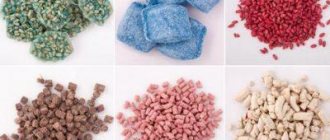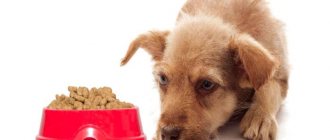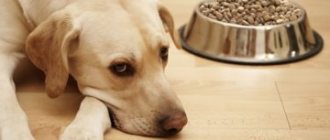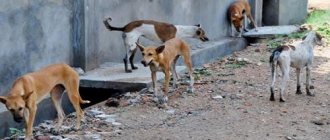Symptoms of poisoning in dogs
Poisoning in dogs
Poisoning in dogs is a fairly common reason for visiting a veterinarian. Contrary to popular belief that an animal will not eat potentially dangerous food, dogs will often eat (especially outdoors) whatever they find.
Symptoms of poisoning in dogs and humans are very similar. Vomiting begins, diarrhea may occur, and muscle weakness appears. The animal refuses food and drinks more water. Also, symptoms may differ depending on what caused it.
What can poison a dog is listed below.
Food poisoning
This type is the most common among pets. Most often, the problem occurs because the dog eats food waste that it finds on the street.
Poisoning can also occur if you feed an animal low-quality food or rotten meat. The first sign is vomiting, the muzzle may begin to swell, and the dog becomes unable to breathe.
If it is not possible to take the animal to a doctor, you can give an antihistamine. Especially if swelling of the muzzle and suffocation have begun. In case of vomiting, it is allowed to give activated charcoal and give the animal more water to drink.
Important! One common type of food poisoning is protein poisoning. A dog can be poisoned by any protein product. For example, if the meat was missing. Poor quality food may also be the cause.
How to find out if your dog has been poisoned by squirrels:
- The coat is dull.
- Constant itching.
- Dandruff appears.
- Weight loss.
You may also notice that the urine has become darker and has an unpleasant odor.
Rat poison
A dog can be poisoned by rat poison on the street due to the activities of dog hunters. The dog can also find poison at home if rats are being poisoned indoors.
Another reason is eating dead animals that have been poisoned by rat poison. Symptoms include weakness in the first two days, lethargy, fatigue, and lack of appetite. Then bleeding from the nose, ears, while going to the toilet, and bloody vomiting may begin. Shortness of breath and pallor of the mucous membranes occur.
Rat poison
Arsenic
Another substance that can poison a dog is arsenic. First signs of a problem:
- The animal constantly rubs its face with its paws.
- Acute attacks of vomiting.
- Diarrhea the color of rice water.
- The barking is almost inaudible; it becomes hoarse and silent.
- Convulsions appear and it becomes difficult for the animal to walk.
If the dog is not helped in time, it can end in death.
Mercury
Mercury is found in many chemical compounds. If an animal has prolonged contact with this substance, acute or chronic intoxication develops.
The following symptoms may appear:
- Diarrhea or enuritis develops.
- Lethargy and weakness appear.
- Urination becomes frequent.
- Lost appetite.
- Coordination of movement is impaired, convulsions or paralysis may occur.
Additional Information! The first thing to do if your dog is poisoned is to contact a veterinarian. In the first 5-10 days after the onset of illness, the animal dies without seeking medical attention.
Poisonous plants
Dogs are very curious creatures that love to try everything they see. Including various plants, and some of them can be poisonous. This problem occurs especially often with puppies.
Signs of this type of intoxication can be different and depend on the type of plant. Although it is not always possible to determine what exactly the dog ate. In any case, if an animal vomits, weakness, swelling, or other suspicious signs appear, you should not hesitate and take action.
Isoniazid
This is a medicine for tuberculosis, which is often used by dog hunters to kill yard dogs. The tablets are usually taken with food. Pets who like to pick up food on the street also suffer from the activities of these people.
Intoxication appears almost immediately. There is weakness, profuse salivation, vomiting blood, and breathing becomes heavy. The danger of this type of poisoning is that if nothing is done, the animal will quickly die.
Medications
At home, a dog may find a first aid kit and, due to its curiosity, try its contents, which will naturally lead to poisoning. The signs are usually the same as for food poisoning.
Drug poisoning
How to help a dog with food poisoning?
When you realize that your pet has been poisoned, you need to gather your willpower, strain your memory and take an anamnesis. You will have time while you wait for the doctor or go to the clinic. The main task is to understand what went wrong as usual. Perhaps you left the pills on the table or the dog refused to eat after a walk (picked up something). The clearer the anamnesis, the fewer assumptions about the nature of the poisoning.
Treatment at home involves providing emergency care, that is, taking measures that stop the absorption of the poison that is still in the intestines. The most obvious action is to give the dog activated charcoal or any other absorbent. If you can do an enema, absorbents are given after the procedure. If you notice that your dog is quickly getting worse, you need to induce vomiting using one of the following methods:
- Mechanically , the fingers are placed on the root of the tongue.
- Stimulating - dogs are forced to drink a large volume of a weak solution of potassium permanganate, a warm solution of salt and water 1:25, a solution of water and hydrogen peroxide 1:1.
Important! All of the above actions are relevant only for food poisoning, since they are aimed at eliminating toxins from the dog’s stomach and intestines. If you suspect that the dog is poisoned by contact poison, the pet should be washed using natural laundry soap.
The poison that has managed to get into the blood circulates throughout the body, causing significant harm every minute. Drinking plenty of fluids in combination with diuretics will help reduce the harmful effects a little. However, diuretics are not harmless in all cases and are contraindicated if the dog’s kidneys are severely damaged.
First aid at home
For any type of poisoning, you need to know what first aid to provide to your pet. For example, if it is not possible to contact a veterinarian or symptoms of poisoning appear at night.
What to do if your dog is poisoned:
- First of all, there is no need to panic. You can help an animal if you remain calm.
- If the dog has eaten something, then you need to induce vomiting (unless the intoxication was caused by petroleum products, acids or alkalis). The pet needs to be given plenty of warm water to drink. The main thing is not to dilute soda or salt in water, it can only make things worse.
- What to give your dog if he is poisoned? If it is not possible to induce vomiting, you need to give your pet absorbents - activated carbon, Enterosgel.
- If the poison gets on the skin, the area should be thoroughly washed with warm water and baby soap.
- Call a veterinarian immediately if vomiting continues for a long time and general health worsens.
After measures have been taken and the pet feels better, you need to stick to the diet for several days.
If your dog is poisoned, you need to show it to a veterinarian.
Main causes of poisoning
hazardous substances, cleaning products or medications in an easily accessible place . For example, antifreeze for cars. It is sweet, and the dog will gladly try it at the first opportunity. The substance will act within a few minutes - the dog will become lethargic, drowsy, convulsions and even paralysis may occur.
Human medications can have dire consequences, such as:
Poor nutrition. Many products are not suitable for animals. For example, chocolate, especially dark chocolate, contains theobromine, which is dangerous for dogs. Depending on the size of the dog and the amount of chocolate, anything can happen: from a simple stomach upset to seizures and even a heart attack. Also dangerous for dogs:
Plants. Approximately 400 species are dangerous to dogs, for example:
Uncontrolled walks. If a dog runs down the street unattended, it can easily pick up and eat poison:
- The medicine against tuberculosis for humans is isoniazid. Most often used by dog hunters (voluntary dog fighters).
- Rat poison. Also used by dog killers, but can also be caught by accident.
Puppies are the most . They are inexperienced and often put things in their mouths just to play. With age, the dog learns that eating from someone else’s hands and picking up pieces on the street is prohibited.
Diet for poisoning
In the first few days after intoxication, the pet’s body is very weakened and everything necessary must be done to help it recover. This is the only way to save the health of the animal.
If your dog is poisoned, what to do and how to help your pet:
- It is not advisable to feed your four-legged pet on the first day. The intestines are still very weak, and the work of the liver is mainly aimed at removing toxins from the body. Feeding your usual food during this period will only worsen the situation.
- Every other day you can give a little boiled porridge (buckwheat or rice) with lean meat.
- It is not recommended to give vegetables and fruits in the near future.
- The animal must have constant access to water.
If the poisoning was severe, it is better to check the diet with a veterinarian.
What foods should you not feed:
- chocolate;
- pasta;
- potato;
- avocado;
- grape;
- dried fruits;
- pork;
- citrus;
- legumes;
- bones.
Note! These products are not recommended for dogs in general. Some of them can cause food poisoning.
Caring for your dog after food poisoning
The general rule for any situation is not to feed after food poisoning. A fasting diet for adult dogs is prescribed at the time of knocking, for puppies for 12 hours. If the poisoning was not associated with heavy metals, the dog does not need to be given milk and fermented milk products for 3 days after the acute condition is removed. To improve the condition of the intestinal walls, it is better to use Smecta, Almagel, etc.
From the second day and throughout the week, the basis of the diet should be light broth and well-boiled rice. If the dog has damaged intestinal walls, for the first 3–4 days only boiled, ground rice and the water in which it was boiled are given. Throughout the diet, it is advisable for the dog to inject general tonic complexes (vitamins).
Sources of intoxication and its causes
The state of acute intoxication in animals is more complex than in humans and occurs when it enters the dog’s stomach:
- Rotten, spoiled food, such as carrion or ergot-contaminated dry food.
- Chemical toxic substances, for example, when a puppy chews an old can of varnish.
- Poisons, this mainly happens in places where poison for rodents is laid out or where dog hunters go “on the warpath”.
The most dangerous substances for a dog’s health, poisoning with which requires urgent contact with a veterinarian, are:
- Rat poison and arsenic.
- Household detergents for both dishes and glass cleaners.
- Isoniazid or tubazid is one of the anti-tuberculosis medications, expired packages of which are often carried by dogs walking next to garbage containers not far from tuberculosis dispensaries.
Unfortunately, the main culprit of acute poisoning in dogs is the neglect of their owners.
The reasons that lead to pet poisoning are usually:
- Picking up leftover food from the ground while walking.
- Swallowing carrion.
- Spoiled dry food as a result of improper storage or transportation.
- Animal games with empty bottles of household chemicals, medicine packages, old bones found on the street.
- Ingestion of poison spread against rodents or bait scattered by dog hunters.
Types of poisoning
Depending on the way toxic substances that can cause poisoning enter the dog’s body, as well as the type of substances that cause intoxication in the dog, poisoning is divided into:
- Food poisoning - toxic substances enter the dog's body through the mouth. The source of food poisoning can be spoiled food, medicines, and household chemicals. Sometimes poisoning in a dog can occur as a result of licking highly toxic drugs from its fur.
- Non-food poisoning - bites of poisonous snakes (the dog was bitten by a snake) or insects (the dog was bitten by a bee or wasp, what to do?). Poisoning from household chemicals, rodent baits, carbon monoxide or gasoline fumes. Overdose of medicinal substances when treating a dog for worms and fleas.
Treatment of poisoning in a veterinary clinic
Upon admission to the veterinary clinic, veterinary specialists will collect a history of poisoning from the dog owner and conduct a clinical examination of the poisoned animal. To identify the type of toxin and assess the general condition of the dog, tests will be taken for research.
Treatment for a poisoned dog will include:
- Gastric lavage.
- Performing an enema to cleanse the intestines.
- The use of diuretics to accelerate the elimination of poisons that have entered the body.
- Administration of the appropriate antidote.
- For intoxication of microbial origin - antibiotics.
- To relieve seizures - anticonvulsants.
- Medicines to normalize breathing.
- Drugs to support the functioning of the liver, kidneys and heart.
Medicines used by the clinic’s veterinary specialists for dog poisoning during intensive detoxification and rehabilitation therapy:
- For drip administration - Ringer-Locke solution, 40% glucose solution, Trisol, Nelit.
- Heart medications - caffeine, cordiamine, sulfocamphocaine.
- Antishock drugs – prednisolone, dexamethasone.
- Hepatoprotectors – intravenous administration of Essentiale.
- Antiemetic - cerucal.
- Antispasmodics – no-spa, baralgin.
- To improve the functioning of the gastrointestinal tract and liver - Liarsin, Verocal, Hepatoject.
- Antipyretic mixture – analgin with diphenhydramine.
First aid and treatment
There are three main principles in helping a dog with poisoning:
- cleansing;
- diet;
- prevention.
Even if the animal’s condition is extremely serious and requires the intervention of veterinarians, the first thing to do while waiting for doctors is to cleanse the animal’s stomach to remove any remnants of the substances that caused the intoxication.
Just like people, it needs to be washed. The difficulty is that the dog is not a person, and will not voluntarily swallow large amounts of liquid. Therefore, solutions are usually prepared that provoke profuse vomiting and flush out all excess from the stomach, and are poured down the animal’s throat. This is done like this:
- The dog's head and neck are held in an upright position.
- The dog's mouth is opened and liquid is poured into the throat.
- Swallow a medium-sized dog like this. Like a German Shepherd, it needs at least 250 grams of solution.
For the convenience of both the owners and the animal itself, it makes sense to place old sheets, duvet covers and, in general, any rags that are sure to be found in the house under the head and back. After the cloth has absorbed vomit and diarrhea, the cloths should be thrown away and replaced with others.
This simple technique will significantly facilitate the hygiene of both the animal itself, which was unfortunate enough to be poisoned, and will relatively normalize the condition of the floor, making future cleaning easier.
Solutions that rinse the stomach of an animal can be as follows:
- 2-3 teaspoons of table salt per 250 ml of water;
- 1 tablespoon of dry mustard per 250 ml of water;
- a solution of hydrogen peroxide and water in a 1:1 ratio;
- solution of potassium permanganate, dark pink;
- a teaspoon of soda per 250 ml of water.
It is better to prepare double volume, since when pouring in, some of the liquid will be added. It will inevitably spill past your throat. As for small dogs, a simple syringe without a needle, of course, will help them flush their stomach.
After the vomit has completely disappeared and the intensive release of foam has stopped, you need to start treatment. If you do without the help of a veterinarian who injects special drugs, then the treatment process is completely similar to the human one. The dog should be given activated carbon at the rate of 1 tablet per 5 kg of animal weight. Repeat every three hours during the day.
If veterinary help is called, the doctor will proceed as follows:
- Make sure that the animal’s stomach is well washed, while at the same time questioning the owners in order to find out the reasons for the poisoning.
- He will inject an antidote; vitamin K is used against most poisons, including rat poisons.
- He will put in a dropper with a water-salt solution, this will help cleanse the animal’s blood of toxins.
- If there are certain suspicions, the veterinarian can administer droppers with glucose and ringer lock solutions.
- In some cases, the doctor gives injections of furosemide to strengthen kidney function and prevent stagnation of urine and Trisol; sometimes Trisol is given as a drip.
In particularly severe cases, the animal is taken to the hospital.
Also, the doctor may consider it necessary to flush the animal’s stomach with a probe, and the intestines with an enema, even if the owners have already flushed the pet’s body themselves. In this case, a large number of rags on the floor around the dog will also come in handy.
As for the prevention of poisoning, this is, first of all, raising your pet, monitoring its behavior, as well as high-quality and sufficient nutrition. A well-fed dog is rarely interested in the remains of dried fish or old bones pulled from trash cans by birds.
Sometimes it is difficult to keep track of an animal, especially if dog hunters are active in the walking areas. In such cases, a muzzle will come to the rescue. Which will reliably protect your pet from all sorts of temptations and preserve his health.
Video: poisoning in dogs and cats.
What can poison a dog?
- Poor quality food. Some owners think that if they feed their dog moldy bread, fermented soup or sour pasta, then nothing will happen to the dog. That is, you can’t eat in the trash, but you can feed what needs to be thrown away? Any animal must be provided with fresh and high-quality food; you cannot skimp on your beloved pet.
- Chemistry. Someone puts cleaning and detergents on the floor, where the animal can easily find it and lick it. And if a young, inquisitive dog also finds it, he will certainly want to try a bottle of cleaning product, for example, for toilets or pipes on his teeth. Shampoos, hair dye, plant fertilizers, rodent and insect repellents, household chemicals, paints and varnishes - all of this poses a serious threat to the life of your dog.
- Drug overdose. Some people think that if you take more tablets or suspension for deworming, the parasites will die faster and leave the pet. However, exceeding the dosage is fraught with serious poisoning; moreover, the blood with the poison is “driven” through the liver and kidneys, where the toxin “settles”. Further, kidney or liver failure may develop. Self-medication is also dangerous. Most owners have no idea how to correctly calculate the dosage of a particular medication. To do this, you should know not only the mass fraction of the active substance in the drug and the pet’s body weight, but also the norm in milligrams of the substance per kilogram of weight for the dog. Therefore, medications can only be given with the approval of a veterinarian and only in the dosage that was prescribed.
- Uncontrolled walks. Not only city parties are dangerous, but also country parties. It just seems to you that there is nothing to poison yourself with in your dacha or village. What about herbicides and pesticides used on vegetables/fruits? What about baiting harmful rodents and insects? It is enough for a dog to lick a fruit treated with poison, run through freshly sprayed bushes (or even potatoes) so that the toxins enter the stomach, skin, fur and respiratory tract. While you are digging in the beds, your barking friend may start playing with the dead mole or eat insects that have come into contact with a strong poison. This is why you should never leave your dog unattended.
- Bite of poisonous snakes, insects. In this case, you need to act very quickly. It is important to know who exactly bit your pet. Otherwise, it will not be possible to select a specific treatment that will save the dog’s life.
Life after poisoning
After successful treatment, the dog needs rehabilitation and special care .
What to feed your dog after poisoning? On the first day, the doctor will recommend not feeding the animal. On the second day, you can give a little low-fat broth. Over the next month, it is better to feed your dog light, healthy food that is easily digestible.
From childhood, you should teach your dog not to eat from someone else’s hands and not to pick up anything on the street. For those who are particularly stubborn, it is worth buying a special muzzle. It is also worth paying attention to the dog’s adequate nutrition so that he does not have to look for missing substances on the street.











